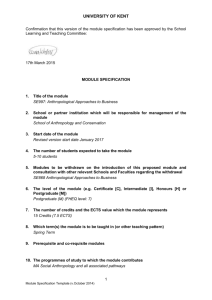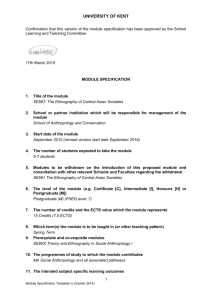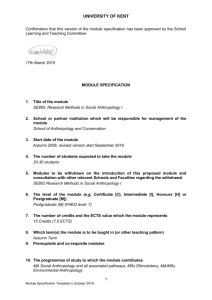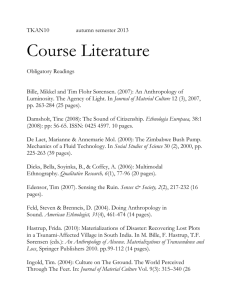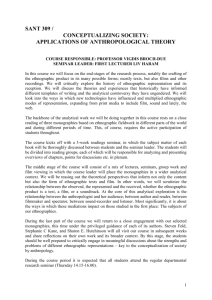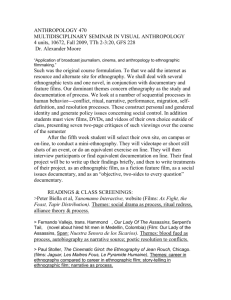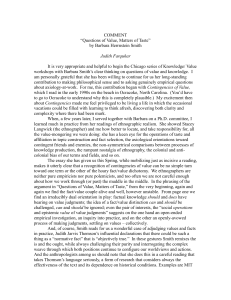UNIVERSITY OF KENT Confirmation that this version of the module
advertisement
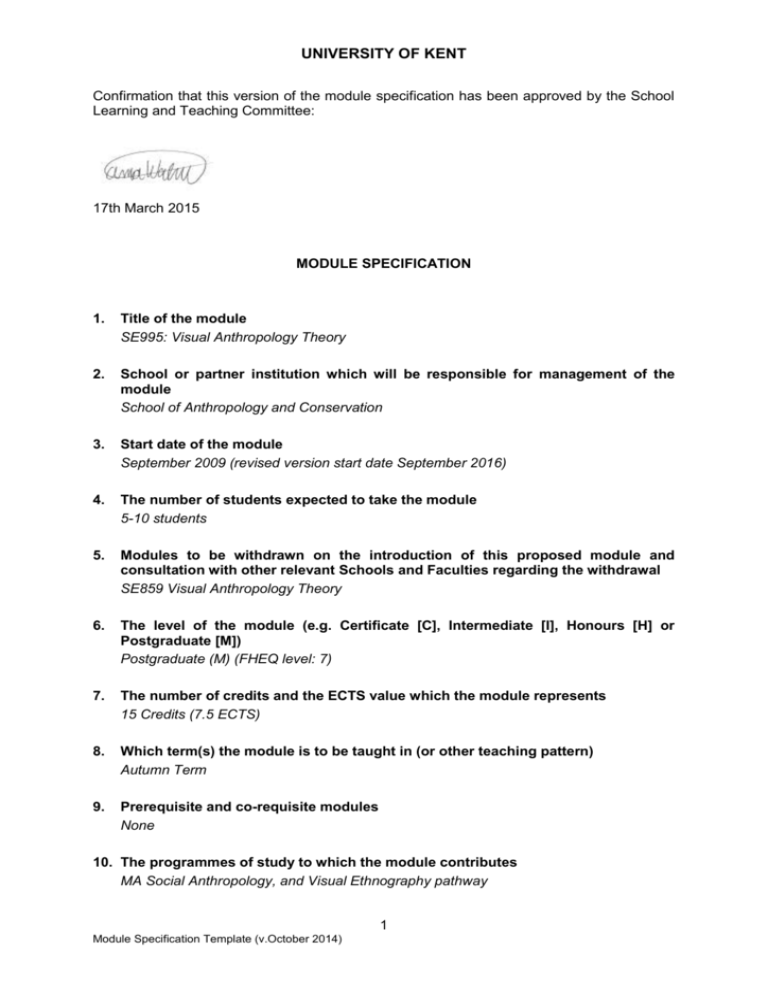
UNIVERSITY OF KENT Confirmation that this version of the module specification has been approved by the School Learning and Teaching Committee: 17th March 2015 MODULE SPECIFICATION 1. Title of the module SE995: Visual Anthropology Theory 2. School or partner institution which will be responsible for management of the module School of Anthropology and Conservation 3. Start date of the module September 2009 (revised version start date September 2016) 4. The number of students expected to take the module 5-10 students 5. Modules to be withdrawn on the introduction of this proposed module and consultation with other relevant Schools and Faculties regarding the withdrawal SE859 Visual Anthropology Theory 6. The level of the module (e.g. Certificate [C], Intermediate [I], Honours [H] or Postgraduate [M]) Postgraduate (M) (FHEQ level: 7) 7. The number of credits and the ECTS value which the module represents 15 Credits (7.5 ECTS) 8. Which term(s) the module is to be taught in (or other teaching pattern) Autumn Term 9. Prerequisite and co-requisite modules None 10. The programmes of study to which the module contributes MA Social Anthropology, and Visual Ethnography pathway 1 Module Specification Template (v.October 2014) UNIVERSITY OF KENT 11. The intended subject specific learning outcomes On successfully completing the module MA/MSc students will be able to: 1) explore the theoretical background of anthropological approaches to visual material. 2) consider methodological and theoretical issues with respect to visual representations. 3) address visual and other sensory aspects of anthropological understanding in the light of visual anthropological theory 4) demonstrate a knowledge of basic techniques of visual production. 12. The intended generic learning outcomes On successfully completing the module MA/MSc students will be able to: 1) Apply general learning and study skills 2) Critically evaluate anthropological information 3) Present ideas systematically and cogently both orally and in writing 4) Interact with peers and teachers in the exchange of ideas 1) Summarise complex material succinctly 2) Retrieve data 13. A synopsis of the curriculum This module is a general introduction to visual anthropology. It includes treatment of crosscultural cognition and symbolic analysis, the contextualisation of the visual within the wider sensorium, the social history of still photography and film relating to ethnographic subjects, the process of ethnographic filmmaking in terms of wider debates related to intersubjectivity, the study of national and regional cinematic traditions (outside Europe and America), the politics and efficacy of indigenous media, the contexts of visual advocacy and activist filmmaking, the nexus of the visual and medical and the comparative ethnography of television and broader consideration of issues of social representation and political ideology in visual imagery. The module combines empirical ethnographic analysis of these issues with the alternative (complementary) contributions of scholars of visual imagery from a literary and humanistic tradition of interpretation. 14. Indicative Reading List Banks, Marcus & Howard Morphy (eds). 1997. Rethinking Visual Anthropology. Yale, UP Ruby, J. 2000. Picturing Culture: Explorations in Film and Ethnography. U of Chicago Press MacDougall, D. 1998. Transcultural Cinema. Princeton University Press MacDougall, D. 2006. The corporeal image: film, ethnography, and the senses. Princeton, N.J.; Oxford: Princeton University Press. Collier, John & Malcolm Collier. 1986. Visual Anthropology Photography as a Research Method. Albuquerque: University of New Mexico Press Crawford, Peter & David Turton (eds). 1992. Film as Ethnography. Manchester University Press Barbash, I., L. Taylor, S. Murray & C. Vaughan. 1997. Cross-cultural filmmaking: a handbook for making documentary and ethnographic films and videos. Berkeley: University of California Press. 15. Learning and Teaching Methods, including the nature and number of contact hours and the total study hours which will be expected of students, and how these relate to achievement of the intended module learning outcomes 2 Module Specification Template (v.October 2014) UNIVERSITY OF KENT This module will be taught be means of a 1 hour lecture (shared with SE554) for 11 weeks and a total of 8 additional contact hours with the module convenor. Depending on the number of students enrolled in the module these contact hours will take the form of seminar groups and/or individual tutorials. Students will also be expected to devote a total of 131 hours to research, reading, coursework preparation and use of online resources provided via the Virtual Learning Environment (Moodle) for this module. Total Contact Hours: 19 Independent Study Hours: 131 Total Study Hours: 150 Table of subject and generic learning outcomes supported by these methods: Teaching & Learning Method Subject Learning Outcomes Generic Learning Outcomes Lectures 11.1, 11.2, 11.3, 11.3, 11.4 12.1, 12.3, 12.5 Seminars/tutorials 11.1, 11.2, 11.3, 11.4 12.2, 12.3, 12.4, 12.5, 12.6 Independent study 11.1, 11.2, 11.3 12.1, 12.2, 12.5, 12.6 16. Assessment methods and how these relate to testing achievement of the intended module learning outcomes The module is assessed by 100% coursework. 65% for a 2000 word essay; 35% for an analytic note on a photograph or film. Table of subject and generic learning outcomes supported by these methods: Assessment Method Subject Learning Outcomes Generic Learning Outcomes Essay 11.1, 11.2, 11.3 12.1, 12.2, 12.3, 12.4, 12.5 Analytic Note 11.1, 11.2, 11.3, 11.4 12.1, 12.2, 12.6 17. Implications for learning resources, including staff, library, IT and space This module requires little in the way of resources other than those already available. Library and School resources, both physical and digital, are regularly reviewed and the module reading list is revised on an annual basis with extra purchases made where necessary. The school's Director of Graduate Studies has responsibility for the staffing of this module. 18. The School recognises and has embedded the expectations of current disability equality legislation, and supports students with a declared disability or special educational need in its teaching. Within this module we will make reasonable adjustments wherever necessary, including additional or substitute materials, teaching modes or assessment methods for students who have declared and discussed their learning support needs. Arrangements for students with declared disabilities will be made on an individual basis, in consultation with the University’s disability/dyslexia support service, and specialist support will be provided where needed. 3 Module Specification Template (v.October 2014) UNIVERSITY OF KENT 19. Campus(es) or Centre(s) where module will be delivered: Canterbury 4 Module Specification Template (v.October 2014)
